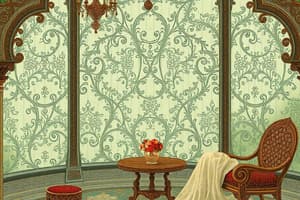Podcast
Questions and Answers
Which of the following are elements of culture? (Select all that apply)
Which of the following are elements of culture? (Select all that apply)
- Language (correct)
- Social Organization (correct)
- Customs and Traditions (correct)
- Economy (correct)
What does Social Structure refer to?
What does Social Structure refer to?
A way of ranking people in a culture.
What defines a Nuclear family?
What defines a Nuclear family?
Mother, father, and children.
What constitutes an Extended family?
What constitutes an Extended family?
What is a Matriarchal family structure?
What is a Matriarchal family structure?
What is a Patriarchal family structure?
What is a Patriarchal family structure?
What do Customs and Traditions encompass?
What do Customs and Traditions encompass?
What is the significance of Language in a culture?
What is the significance of Language in a culture?
What are the Arts and Literature?
What are the Arts and Literature?
What is the role of Religion and Spiritual Beliefs in culture?
What is the role of Religion and Spiritual Beliefs in culture?
What is Monotheism?
What is Monotheism?
What is Polytheism?
What is Polytheism?
What is Atheism?
What is Atheism?
What does Government do in a culture?
What does Government do in a culture?
What is a Monarchy?
What is a Monarchy?
What is a Republic?
What is a Republic?
What defines a Dictatorship?
What defines a Dictatorship?
What is Direct Democracy?
What is Direct Democracy?
What is Representative Democracy?
What is Representative Democracy?
What is Economy in terms of culture?
What is Economy in terms of culture?
What is Capitalism?
What is Capitalism?
What is Socialism?
What is Socialism?
What is Communism?
What is Communism?
What is Social Organization?
What is Social Organization?
What are Mores?
What are Mores?
What is a Symbol in cultural context?
What is a Symbol in cultural context?
What are Values?
What are Values?
What are Norms?
What are Norms?
Flashcards are hidden until you start studying
Study Notes
Elements of Culture
- Seven key elements: Social Organization, Customs and Traditions, Language, Arts and Literature, Religion, Government, and Economy (SCLARGE).
Social Structure
- Framework for ranking individuals within a culture.
- Types include Nuclear families, Extended families, Matriarchal, and Patriarchal.
Nuclear Families
- Consists of a mother, father, and their children.
Extended Families
- Includes additional relatives such as uncles, aunts, grandparents, and cousins.
Family Structures
- Matriarchal: Family structure led by the mother or oldest female.
- Patriarchal: Family structure led by the father.
Customs and Traditions
- Rules of behavior unique to each culture.
- Essential components taught and inherited within cultural contexts.
Language
- A system of communication involving thoughts, feelings, and knowledge.
- Mirrors cultural identity and includes words and symbols facilitating interaction.
Arts and Literature
- Represents human imagination and personal expression.
- Reflects cultural values and strengthens community identity.
Religion and Spiritual Beliefs
- Addresses fundamental questions regarding life’s meaning and purpose.
- Supports group values, with forms including Monotheism, Polytheism, and Atheism.
Types of Religion
- Monotheism: Belief in a single God.
- Polytheism: Belief in multiple gods.
- Atheism: Lack of belief in any deity.
Government
- Enacts and enforces laws.
- Types include Monarchy, Republic, Dictatorship, Direct Democracy, and Representative Democracy.
Forms of Government
- Monarchy: Ruled by a king or queen.
- Republic: Governed by elected representatives.
- Dictatorship: Control by a single ruler who seizes power.
- Direct Democracy: Power rests directly in the hands of the people.
- Representative Democracy: People elect representatives to govern on their behalf.
Economy
- The system managing the production and trading of resources, often influenced by government control.
- Types include Capitalism, Socialism, and Communism.
Economic Systems
- Capitalism: Controlled by private individuals who seek profit.
- Socialism: Government regulation and control of economic activities.
- Communism: Collective ownership of economic resources.
Social Organization
- Relationships among individuals and social groups impacting structures like families, teams, and institutions.
Mores
- Norms dictating morally right or wrong behaviors, such as maintaining eye contact in conversation as a sign of respect.
Symbols
- Representational figures, such as a cross for Christians or a Star of David for Jews.
Values
- Culturally defined standards representing what is considered good or bad, exemplified by the education requirement for children.
Norms
- Expectancies of behavior guiding individuals on appropriate actions in various social contexts, such as the use of utensils while eating.
Studying That Suits You
Use AI to generate personalized quizzes and flashcards to suit your learning preferences.




